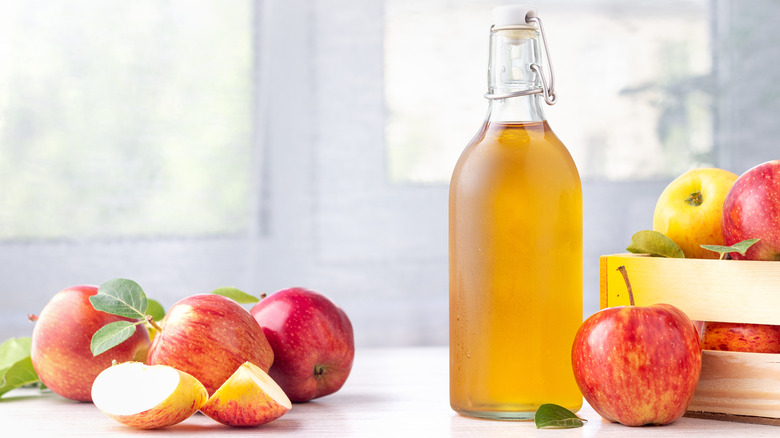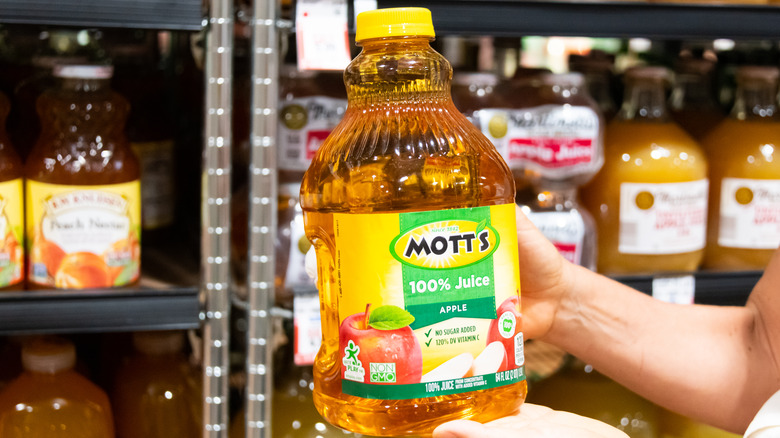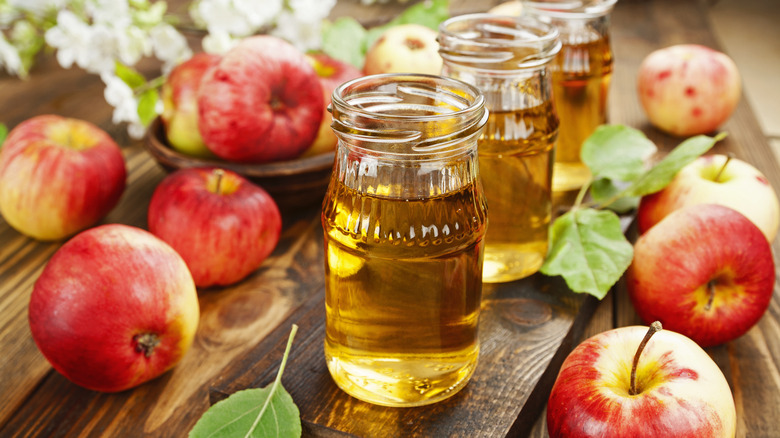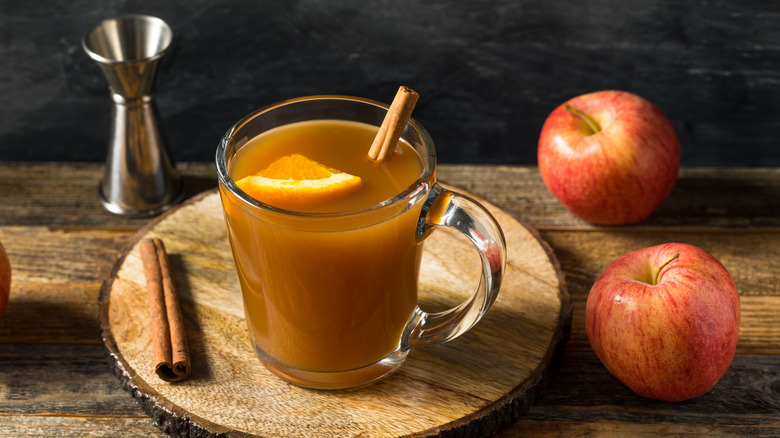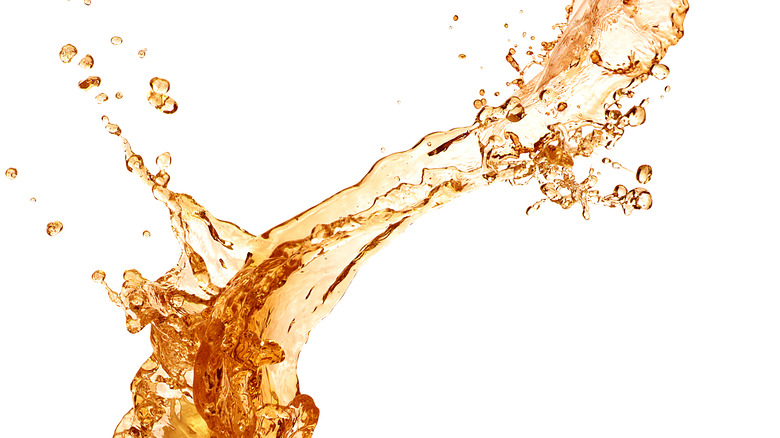When You Drink Apple Juice Every Day, This Is What Happens To Your Body
Life may be a bowl of cherries, but only an apple a day is reputedly capable of keeping the doctor away, or so it's been said in one form or another since Victorian times, according to Healthline. Of course, "reputedly" is an important qualification here, since science has not yet managed to prove a statistically significant relationship between the eating of an apple a day and doctor's visit avoidance in humans. On the other hand, people who eat apples on a daily basis may take fewer prescription medications than those who don't, according to a 2015 study published in JAMA Internal Medicine. In addition, studies have linked the consumption of apples to a reduced risk of various cancers, cardiovascular disease, and metabolic disorders, including diabetes and related insulin resistance, per Medical News Today.
So, if apples are healthy for you, how about apple juice? The fact that nearly 1.49 million juice extractors were sold in the U.S. in 2019 would suggest that quite a lot of people enjoy consuming their fruits as juices. While studies suggest that drinking the juice of a fruit is no more beneficial than eating the fruit itself, per Mayo Clinic, and some experts recommend always choosing the fruit over the juice, is it nevertheless possible to get the same, or at least comparable, benefits from drinking apple juice as you can from eating apples? Join us as we delve into what happens to your body when you drink apple juice every day.
Apple juice nutrition facts
Apple juice's nutritional value comes mainly from supplying energy in the form of calories, according to Nutritionix, which points out that one cup of apple juice contains around 114 calories. (This, of course, can vary based on the type and brand of apple juice.) Apple juice generally contains about 28 grams of carbohydrates, and of that, 24 grams are from sugars and .5 are from fiber.
If it sounds like apple juice is high in carbohydrates and sugar, that's because it is. But so are apples, according to the USDA, which says a medium apple contains about 25 grams of carbohydrates, 19 of which are from sugars, and 3 from fiber. As you can see, both apples and apple juice are high in sugar, most of which is fructose, according to Healthline. However, the higher fiber content in apples themselves means the fructose is digested more slowly when you eat an apple, versus when you drink a cup of apple juice, so you may feel hungrier sooner after drinking apple juice than you would after eating an apple.
In terms of micronutrients, apple juice isn't going to do much toward satisfying your daily vitamin and mineral requirements, according to Healthline – unless it has been fortified with vitamin C, as it sometimes is. On the other hand, the plant compounds in apple juice may offer some longterm benefits, as discussed later.
You might be getting too much of this kind of sugar
Apple juice gets its sweetness from fructose (via Healthline). Fructose consumption increases blood sugar levels, but not to the level of a "spike," according to Livestrong. The bigger issue with the fructose in apple juice is how much we end up consuming — because it's possible, if not a little too easy, to consume a lot of apple juice without realizing, per Well+Good.
Although it is a naturally occurring form of sugar found in fruit, fructose is associated with a number of negative health conditions when consumed in excess, according to a 2008 meta-analysis published in the American Journal of Clinical Nutrition. Those health conditions include all of the various conditions associated with metabolic syndrome, such as "insulin resistance, elevated triglycerides, abdominal obesity, elevated blood pressure, inflammation, oxidative stress, endothelial dysfunction, microvascular disease, hyperuricemia, glomerular hypertension and renal injury, and fatty liver."
According to the authors of the 2008 meta-analysis, it would appear that one can safely consume up to 90 grams of fructose per day. As discussed above, a one-cup serving of 100% apple juice delivers somewhere in the vicinity of 24 grams of fructose. So, you can see how that might add up rather quickly, which is why Samantha Cassetty, RDN, recommends limiting consumption to one cup per day (per Well+Good).
Apple juice consumption is associated with a higher risk of rheumatoid arthritis
The above-referenced 2008 meta-analysis focused on the metabolic conditions that may be correlated with the consumption of excess fructose, which is the naturally-occurring sugar that gives apple juice its sweetness. A later study published in 2016 in the Journal of Diabetes and Nutrition added rheumatoid arthritis to the litany of medical conditions that are now associated with the regular drinking of fructose-sweetened beverages, including apple juice. Rheumatoid arthritis is a chronic autoimmune disorder that causes arthritic pain and inflammation in joints, but may also present as inflammation in various organs of the body, per Mayo Clinic.
In the 2016 study, which was based on questionnaire data elicited from a cross-sectional sample of 1,209 adults ages 20-30, the researchers found that those who reported drinking apple juice and/or other fructose-sweetened beverages five or more times per week were three times more likely to develop rheumatoid arthritis — although the study did not suggest a causal relationship. A 2018 article published in the journal Reumatologica cited the study in support of its thesis that greater attention must be paid to how diet may affect the development and progression of rheumatoid arthritis. It also listed apple juice as one of the lifestyle factors that is known to promote rheumatoid arthritis.
Drinking apple juice can help reduce inflammation
Although apple juice consumption has been associated with increased risk of rheumatoid arthritis, studies have also shown that eating apples may be associated with lower levels of inflammation (via Medical News Bulletin). According to Healthline, this may be because apples are rich in polyphenols. Polyphenols are a subclass of phytochemical (i.e., a plant-based compound) known to help protect against inflammation, according to a 2016 paper published in Oxidative Medicine and Cellular Longevity. The obvious question, then, is whether the same can be said of apple juice, and that's one of the questions that the 2016 paper sought to address.
A February 2022 review of the health benefits of apple juice noted, "Polyphenols can be lost in part during juice processing mostly due to the oxidative conditions of pulping, pressing and clarification." Accordingly, the less processed the apple juice, the richer it may be in polyphenols. If that's important to you, then cloudy apple juice, which doesn't have the pulp removed, may be your best option as far as juices go.
Cloudy apple juice may also be your best option if you're hoping to benefit from the fiber pectin's ability to mitigate inflammation through antioxidant activity. It may also help decrease inflammation through activity in the gut, which, among other things, helps balance its flora. The problem with pectin is that much of it is removed during the processing of apples into clear juice (i.e., no pulp), per a 2013 study published in European Journal of Nutrition.
Apple juice consumption can reduce your cancer risk
Carcinogenesis is an extraordinarily complex process, but one contributing factor is inflammation, according to the authors of a comprehensive review of the health benefits of apple juice that was published in February 2022 in the journal Nutrients. As discussed above, regular apple juice consumption may be protective against inflammation to the extent the juice is not processed to the point where the polyphenols and pectin have been removed — i.e., the cloudier the apple juice, the more beneficial it may be for you in this respect. Drinking apple juice may help to prevent the growth of cancer cells in other ways as well, although further research needs to be done.
For example, a 2008 study published in the European Journal of Nutrition, in which researchers gave colon cancer patients cloudy apple juice to drink before having part of their intestines removed via ileostomy, found cancer-fighting polyphenols in the ileostomy samples. That's good news in terms of cloudy apple juice being a useful polyphenol delivery system to the intestines. What is not yet discernible is whether and to what extent the available polyphenols might actually fight cancer growth in the intestines. For that reason, as well as many others, this research is still in its infancy, although a 2009 review published in Molecular Nutrition and Food Research does assert independently that apple juice may reduce colon cancer risk for some.
Drinking apple juice every day can protect your heart
According to the aforementioned 2022 review, apple juice consumption has been linked to better cardiovascular health. In fact, the study authors made that conclusion after reviewing and analyzing 20 studies, which demonstrated that consuming moderate amounts of apple juice can be protective of cardiovascular health, as measured by various markers of cardiovascular disease risk, including measures of oxidative stress.
Likewise, Healthline points out that scientific literature is rife with studies demonstrating that the polyphenols contained in apple juice (and particularly cloudy apple juice, for the reasons discussed above) can support cardiovascular health. It even cites a 2000 study in which healthy adults drank 12 ounces of clear apple juice for a period of six weeks. At the end of the study period, blood tests revealed LDL cholesterol that was 20% more resistant to oxidation than it had been when first measured at the start of the study.
LDL oxidation is one of those aforementioned markers of cardiovascular disease risk, according to Future Medicine. The reason why it's useful as a marker is that increased LDL oxidation is actually what causes cholesterol to accumulate in the arteries, according to a 2021 paper published in Current Molecular Pharmacology. In fact, that accumulation is the hallmark of atherosclerosis. As the study authors point out, many other studies have found that polyphenols help prevent that accumulation, likely by helping circumvent that oxidation process.
A daily cup of apple juice could do your brain a favor at any age
In 2011, the authors of a comprehensive review of apples and apple components (e.g., plant compounds) and their relationship to human health acknowledged that little research has been done regarding how apples and apple juice might decrease the risk of Alzheimer's and/or slow age-related cognitive decline. However, the little research that had been done at the time seemed to suggest to them that apples and apple juice might eventually be neuroprotective — meaning it could help improve neural functions.
Currently, there is still a dearth of research on the relationship between apple juice consumption and neuro/cognitive health in humans, but the aforementioned 2022 review of the health benefits of apple juice may fill in some gaps. First, it cites a 2010 study in which adults with moderate-to-late-stage Alzheimer's consumed one cup of apple juice daily for one month. At the end of that month, they showed improvements in terms of behavioral and psychological symptoms (e.g., agitation, anxiety, and delusional ideation). On the other hand, no such improvement in cognitive performance was observed.
Slightly more attenuated, but still considered relevant enough for mention by the authors of the 2022 review, is a 2003 study published in JAMA Pediatrics that shows that apple juice can help children absorb iron from their meals. The neuro/cognitive connection the authors make is that iron-deficiency anemia is associated with higher risk of dementia.
Apple juice can help keep you hydrated
Apple juice's water content is 88%, according to Healthline, which means it's almost as full of water as water itself. It's also universally appealing. So, obviously, apple juice is a great source of hydration (assuming you're not substituting more than a cup or so per day for water, per Samantha Cassetty, RDN, via Well+Good). It also supports optimal fluid balance in the body, because it contains moderate levels of potassium.
According to the Harvard T.H. Chan School of Public Health, potassium is an essential mineral which is responsible for maintaining your intra-cellular fluid balance (sodium regulates fluid balance outside the cells). If you're wondering what fluid balance does for you, among other things, it keeps your muscles contracting and your blood pumping at optimal pressure for optimal oxygen delivery throughout your body. According to the American Heart Association, adults need 4,700 mg of potassium each day. A small apple will give you about 150 mg, according to Drugs, but an eight-ounce serving of apple juice offers 300 mg.
So, not only will drinking apple juice daily help you stay hydrated, it will also put a significant dent in your daily potassium requirements in support of your body's overall fluid balance. And that might go a long way to explaining why apple juice was more effective at reducing the need for IV fluids in mildly dehydrated children who were the subject of a 2016 study published in JAMA.
You might want to rethink your daily apple juice if you're concerned about kidney stones
Hydration can help prevent kidney stones, according to a 1996 study published in the American Journal of Epidemiology. However, that study also indicates that apple juice may not be an ideal hydration delivery system for this purpose. For that study, the researchers analyzed data elicited by questionnaire from 45,289 men, ages 40 through 75, none of whom had a history of that kidney stones. During six years of follow-up, what the researchers discovered is that the men who reported drinking one or more cups of apple juice daily were actually 35% more likely to be diagnosed with kidney stones those who did not. In other words, hydrating with apple juice didn't do any favors for these subjects when it came to the risk of developing kidney stones. By contrast, the beverages that were associated with a reduced risk of kidney stones were coffee (10% reduction in risk), tea (14% reduction), beer (21%), and wine (38%).
However, studies indicate that there is one kind of kidney stone of which drinking apple juice may be able to reduce the risk: a brushite stone (via The New York Times). As described by ClinicalTrials.gov, brushite stones sound particularly unpleasant, as they tend to recur and often require surgical intervention. On the other hand, they're quite rare. So this may be a question of picking one's battles.
Apple juice can relieve constipation, but it can also have the opposite effect
Drinking apple juice every day may actually help to keep constipation at bay, according to Healthline — although not quite as well as eating an apple a day. Apples, whether eaten whole or as juice, are high in fructose, which can help keep things moving along through your digestive tract. When eaten whole, the fiber content in apples also supports regular bowel movements, according to Medical News Today. The same cannot be said of apple juice, even cloudy apple juice, although the latter may arguably have a slightly higher fiber content than clear apple juice, per a 2013 study published in the European Journal of Nutrition. The dearth of fiber in apple juice may be why apple juice's laxative effect is described by Healthline as "gentle."
On the other hand, however, too much apple juice can cause gastrointestinal distress, including diarrhea, according to Allison Gregg, RDN, LD/N, via Eat This Not That. "Your body is only capable of digesting a certain amount of fructose at one time," Dr. Gregg explained. "If too much is consumed, diarrhea can occur." Complicating matters is the fact that "too much" can vary from person to person. In fact, a 1985 study published in JAMA Pediatrics pointed out that in some children, "nonexcessive apple juice intake" may cause diarrhea. And by non-excessive, the study authors seemed to be suggesting that as little as one cup of apple juice can be the culprit.
Apple juice may interact with certain medications
Before you start drinking apple juice on a daily basis, it's important to consider that apple juice may interact with certain drugs, both prescription and over-the-counter. For example, fexofenadine, the active ingredient in the allergy medication Allegra, may be less effective when taken with apple juice because the juice may decrease how much of the drug your body absorbs, according to Rx List. Accordingly, Rx List recommends a gap of four hours between taking this drug and drinking apple juice.
As discussed above, apple juice affects blood sugar levels, albeit not dramatically, per Livestrong. Still, that can be problematic if you're diabetic and/or are taking medication to lower your blood sugar levels. Accordingly, if you're thinking about adding a daily glass of apple juice to your diet, you might want to discuss it with your healthcare practitioner to determine whether it may be, or could become (depending on your blood sugar readings after drinking apple juice), necessary to adjust your diabetes medication dosage.
Apple juice may also not be the best thing to incorporate into your daily diet if you're dealing with elevated blood pressure, according to Time, referencing a 2015 study that found that frequent fruit juice consumption is associated with higher blood pressure readings. Accordingly, Rx List suggests that apple juice may interfere with blood pressure medication, so it's advisable to check with your doctor before upping your apple juice intake.
Apple juice may not be doing wonders for your teeth
Some dentists advise their patients that eating an apple can help keep teeth clean in between brushings. For example, the pediatric dental professionals at Houston Pediatric Dentist state that eating apples can clean teeth by scrubbing away plaque and food debris. However, a 2018 study published in PLOS ONE challenges that claim. For that study, 20 adults with generally good oral health were divided, at random, into two groups. One group was told to brush their teeth between meals. The other group was told to eat an apple. After two weeks, the researchers found that eating an apple didn't remove plaque, and actually seemed to favor the growth of plaque over the next 24 hours.
On the other hand, the 2018 study also found that eating apples effected an immediate "reduction in salivary bacterial viability similar to that after tooth brushing." It's possible that this effect is due to apples being highly acidic, according to the pediatric dental professionals at South Davis Kids. In fact, the dental professionals at Houston Pediatric Dentist acknowledge that the acidity in apples can help eliminate some of the bacteria that cause bad breath.
Since apple juice is acidic as well, one might assume that drinking apple juice might have that same effect on salivary bacteria and its effect on breath. However, it appears that in juice form, that same acidity may go so far as to attack tooth enamel (via South Davis Kids).
